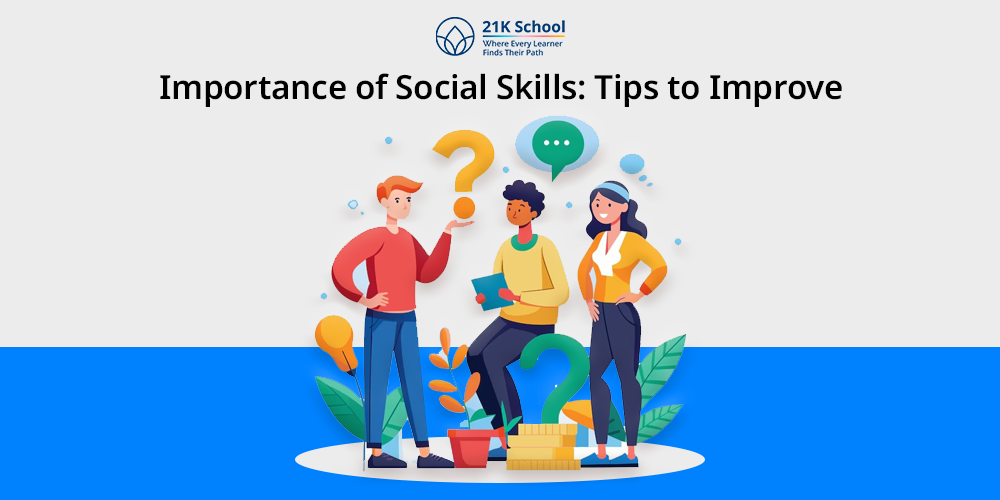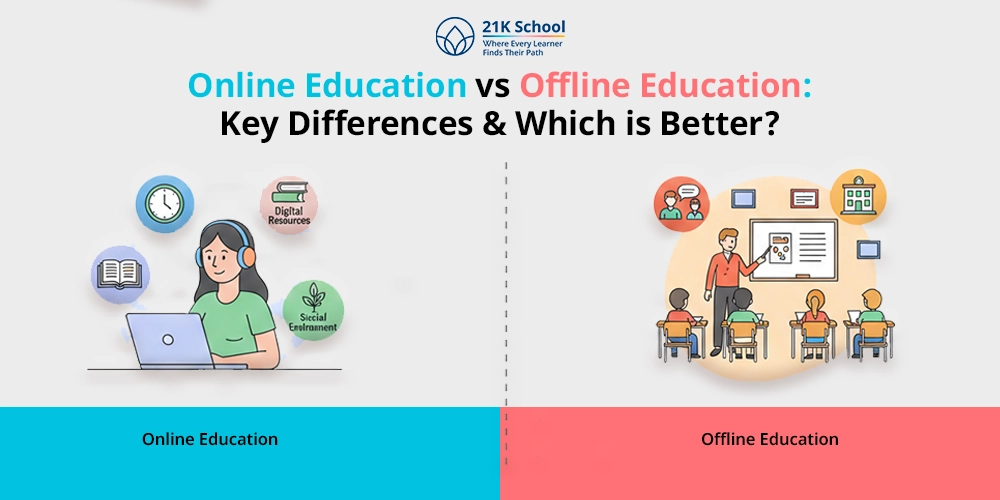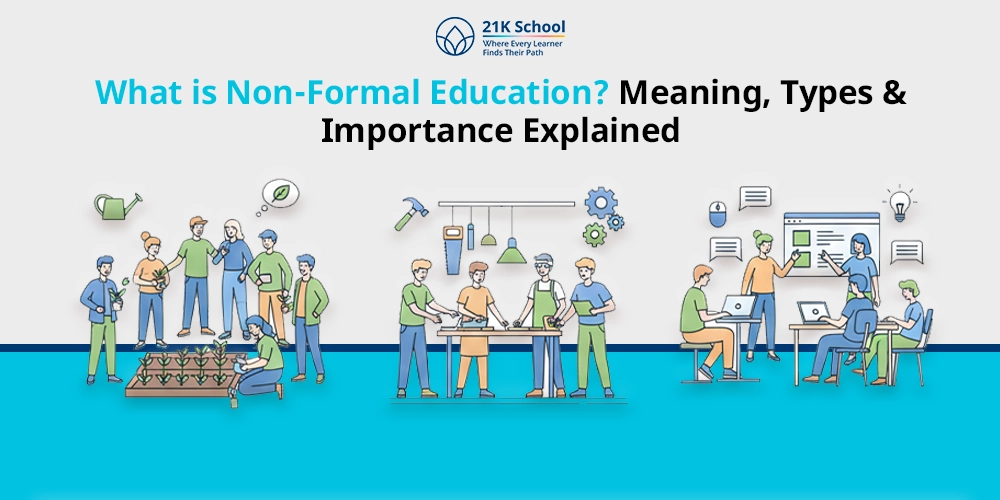
In this era education is not limited to memorizing and retention of lessons. Learners need various essential social skills to enhance their learning .
But why are social skills important in a learner’s life? Social skills are all about connecting classroom learning to work places.
It is an ideal way to determine academy success with personal growth and higher education. To build trust, improve connection and create a positive environment, social skills play a crucial role.
Here we will understand what social skills are, their importance in students’ education journey and tips to improve in the 21st century.
Contents
- What are Social Skills?
- Top 12 Importance of Social Skills
- 1. Enhance Communication Skills
- 2. Academic Success
- 3. Conflict Resolution
- 4. Promotes Empathy
- 5. Develop Cooperation
- 6. Adaptability
- 7. Promotes Mental Health
- 8. Career Advancement Opportunities
- 9. Develop Personal Relationship
- 10. Networking Opportunities
- 11. Develop Leadership Skills
- 12. Developing Emotional Intelligence
- 5 Tips For Improving Social Skills
- Conclusion
What are Social Skills?
Social skills are the different techniques which help letters to interact communication and ask help whenever needed.
It includes verbal communication means speaking & listening and nonverbal communication such as way of talking, gestures, expression and body language.
These crucial points are important for students to control their emotions and make the right decision.
Some common examples of social skills include proper conversation, teamwork sharing, active listening and response.
Top 12 Importance of Social Skills
People nowadays don’t pay attention to social skills. However these skills are important to enhance a positive learning environment .
It supports children from a young age by guiding them how to work on problem solving , improve collaboration skills and critical thinking skills .
1. Enhance Communication Skills
Enhancement of communication skills refers to clear and effective talking to express one’s own feelings and understand others without any discomfort.
By including social skills, learners can improve communication which directly helps in problem solving, collaborating with others for projects and getting proper feedback.
2. Academic Success
Social skills directly impact academic success of learners. Various techniques such as communication, collaboration and interaction ensure career advancement.
Remember that students who have strong social skills are more comfortable with other learners and teachers.
3. Conflict Resolution
Whether it’s with teachers or students, positive conflict resolution is important for each individual. And social skills help to stay calm, listen to others’ perspectives and explain your point effectively.
This not only causes problems but also creates an environment where individuals respect each other and stand their relationship with time.
4. Promotes Empathy
Empathy refers to the skill in which one understands and shares others feelings. Promoting empathy is one of the core parts of social skills.
It helps to increase trust and guide individuals to connect deeply, feel the emotion and respond with compassion.
5. Develop Cooperation
Social skills enhance with the development of cooperative learning . Learners are guided to walk together as a team while learning/project.
Developing corporation skills helps them to achieve common goals especially in the classroom setting.
6. Adaptability
Adaptability means the ability to adapt in a new learning environment or different situation. Social skills in students make sure they understand the circumstances and behave according to that.
This adaptive behaviour represents their good quality and personality in the society.
7. Promotes Mental Health
Improvement in social skills in students’ lives promotes good mental health . It reduces the feeling of loneliness and isolation by giving enough support.
This can be done simply by discussion, interaction or group activity that engages kids without any stress.
8. Career Advancement Opportunities
For career advancement and new opportunities in education social skills are very helpful. It improves relationships through communication in collaboration.
With strong social skills learners not only perform well in academics but also in personal development .
9. Develop Personal Relationship
Having a healthy and personal relationship with others leads to good communication, resolution of conflict and empathy to build connections for the long term.
A strong social skills in learners from a young age contributes to personal educational success and happiness.
10. Networking Opportunities
Networking opportunity means connecting with diverse field individuals to share and gain knowledge .
People share each other’s ideas or project details to get feedback or guidance for improvement. This kind of support improves both professionally and personally.
11. Develop Leadership Skills
Development of leadership skills is not one day’s work. It requires time to inspire a group of people to share a common vision and create a positive working environment.
A leader is responsible for the group by resolving conflicts, supporting financially and encouraging effective teamwork. All this can be done by developing a strong social skill.
12. Developing Emotional Intelligence
To get success in both professional and personal development of emotional intelligence in social skills is crucial.
A good EQ is important to understand the environment, resolve social scenarios and build interpersonal skills.
With a positive attitude and inner strength individuals can improve their leadership qualities.
5 Tips For Improving Social Skills
Social skills represents the personality of an individual in the world. Strong social skills increase self-confidence in children and communication skills.
Individuals who want to implement social skills in daily life can go through this quick tips:
1. Engage with Others
Initiative conversation or engaging in communication improve social skills of students. This can be done by starting small talk, sharing opinions and walking on academic challenges.
2. Indulge in Active Listening
Active learning refers to giving attention to other individuals and summarising communication and sharing yours.
This can be done with the help of eye contact communication skills which is the part of active listening.
3. Ask Open-ended Questions
With the help of different open ended questions are simply yes and no methods to develop social skills in individuals.
It encourages people to deal with social situations and get help or feedback whenever needed.
4. Provide Compliments
To improve social complements social skills can be helpful. It can be from anyone, peers, facilitators or parents.
Complements not only guide them to write direction but also motivate that others are admiring their efforts.
5. Develop Empathy
Empathy plays a role in social skill development of individuals. One can do this by patiently understanding others’ perspectives, showing kindness and support in challenging situations.
Explore how to develop empathy in a child .
Conclusion
The importance of social skills is seen in both personal and professional life of learners. Improvement in the skills provide confidence, strength and motivate them to start conversation with others.
From enhancing communication to building connection and solving social conflict it helps in every stage of learning.
Social skills take time and practice to improve and that’s how people interact with the world effectively.
It’s time to invest in the skills that enhance the personality to support continuous learning and knowledge retention.



